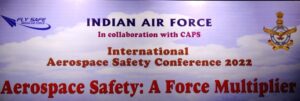
The international aerospace conference was conducted by the Indian Air Force recently. There were three sessions at the conference and the themes were as follows:
- Session 1: Human error
- Session 2: Maintenance safety
- Session 3: Damage due to foreign objects and bird/animal strike.
I was lucky to be associated with the conference and it had lots of takeaways. The link to the video on excerpts is below:
For selective viewing click on the links below:
- Summarising talk on FOD
- Engine withdrawals
- FOD prevention equipment becoming FOD source.
- FOD at production agencies.
- Alertness by everyone is essential.
- Summarising talk on bird/animal strike.
- Six verticals of anti-bird measures (habitat, exclusion, harassment, hard measures, platform features, and procedural)
- Hazards due to reptiles and rodents.
- Birds get used to the measures – need for constant change of measures.
- Each airfield has its own peculiarities – it is not a one solution fits all.
- Need for BIRDTAMS.
- Environment control around the airfields.
- Aircraft designs to prevent injury due to shattering of the canopy due to bird strike.
- Summarising Talk on tools management.
- RFID tagging
- Tool crib to tool control ops room.
- Issue of panels flying off in the air.
- Q and A Session
- Application of threat and error management concept to bird strike control.
- Myth or reality – Birds fold their wings and dive down when threatened of collision.
- Suggestions post-session 1 on Human error.
- Importance of “ownership” in the flight safety culture (example of mother and child).
- “It is my job – I will do it well and I will do it safely”.
- CFIT – “Superior skill is required to avoid getting into dangerous situations rather than getting out of them”.
- Review of carrot and stick policy of safety implementation.
- Periodic assessment of “Risk Profile and Emotional Quotient” of the crew.
- Suggestions post-session 2 on Maintenance safety
- Increase of Flight safety element and weightage in the professional categorization tests.
- Adverse effects of over monitoring.
- Rules of delegation – “Don’t keep a dog and bark yourself”.
Bottom Line
Aerospace safety is everyone’s responsibility.
Question
Why do human beings insist on making their own mistakes rather than learning from others?
Suggestions and value additions are most welcome
For regular updates, please register here
